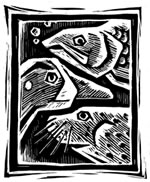- Home
- Restoration Projects
- Project Search
- SEA: Role of Zooplankton in the PWS Ecosystem 94320-H
Project Information
Title: SEA: Role of Zooplankton in the PWS Ecosystem 94320-H
Project Year and Number: 1994: 94320-H
Other Fiscal Years and Numbers for this Project: 1999: 99320-H-CLO, 1998: 98320-H, 1997: 97320-H, 1996: 96320-H, 1995: 95320-H
Principal Investigator (PI): Ted Cooney (University of Alaska Fairbanks)
Managing Agency: ADFG
Assisting Personnel: Ted DeLaca, Joan Osterkamp, Donald Schell, Albert Tyler
Research Location: Prince William Sound
Restoration Category: Research
Injured Resources Addressed: Not Specified
Abstract: This project is a component of the Sound Ecosystem Assessment (SEA) program, a multi-disciplinary effort to acquire an ecosystem level understanding of the marine and freshwater processes that interact to constrain levels of fish, marine bird, and marine mammal production in Prince William Sound (PWS). This component is designed specifically to provide information on the trophic ecology of consumer populations in PWS, through the investigation of a zooplankton-modulated prey-switching mechanism hypothesized as setting levels of carrying capacity for juvenile fishes each year. Recent observations indicate that good zooplankton years provide an ecological refuge for fishes from predators. Conversely, when upper layer macrozooplankton stocks are low, consumers are forced to derive more of their energy from small fishes. Zooplankton will be sampled in the upper-layers of the water column along the juvenile pink salmon migratory route in PWS. Samples will be analyzed, their taxa will be identified and enumerated, and a census of over wintering populations will begin.Proposal: Not Available
Reports:
Final Report: View (450 KB)
Publications from this Project: None Available
